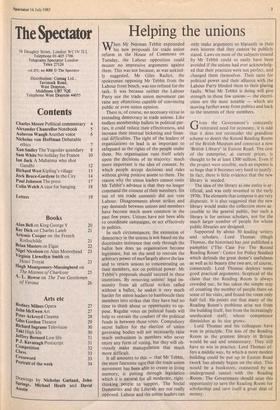Helping the unions
When Mr Norman Tebbit expounded his new proposals for trade union reform in the House of Commons on Tuesday, the Labour opposition could muster no impressive arguments against them. This was not because, as was unkind- ly suggested, Mr Giles Radice, the spokesman opposing Mr Tebbit from the Labour front bench, was too refined for the task. It was because neither the Labour Party nor the trade union movement can raise any objections capable of convincing public or even union opinion.
There is, of course, no necessary virtue in extending democracy in trade unions. Like endless membership ballots in political par- ties, it could reduce their effectiveness, and increase their internal bickering and finan- cial difficulties. The right of the leaders of organisations to lead is as important to safeguard as the rights of the people under them. No organisation runs itself solely upon the decisions of its majority: much more important is the idea of consent, by which people accept decisions and rules without giving positive assent to them. The reason why the union leaders cannot resist Mr Tebbit's advance is that they no longer command the consent of their members. Six out of ten trade unionists did not vote Labour. Disagreements about strikes and pay demands between unions and members have become much more common in the past few years. Unions have not been able to coordinate campaigns, or act effectively in politics, In such circumstances, the extension of democracy in the unions is not based on the doctrinaire insistence that only through the ballot box does an organisation become legitimate, but on the need to restrain the arbitrary power of menlargely above the law and to return unions to concentrating on their members, not on political power. Mr Tebbit's proposals should succeed in these intentions. By removing unions' legal im- munity from all official strikes called without a ballot, he makes it very much harder for union leaders to bamboozle their members into strikes that they have had no time to think about or opportunity to op- pose. Regular votes on political funds will help to restrain the conduct of the political funds in between those votes. Compulsory secret ballots for the election of union governing bodies will not necessarily raise much enthusiasm in members who never enjoy any form of voting, but they will ob- viously make manupulation that much more difficult,
It all amounts to this — that Mr Tebbit, the most fearsome ogre that the trade union movement has been able to create in living memory, is putting through legislation which it is natural for all moderate, right- thinking people to support. The Social Democrats and the Liberals are not really opposed. Labour and the union leaders can only make arguments so blatantly in their own interest that they cannot be publicly stated. Laws on most of the subjects treated by Mr Tebbit could so easily have been avoided if the unions had ever acknowledg- ed that their practices were not perfect, and changed them themselves. Their taste for political power and their alliance with the Labour Party blinded them to their glaring faults. What Mr Tebbit is doing will give strength to those few unions — the electri- cians are the most notable — which are moving further away from politics and back to the interests of their members.
Given the Government's constantly reiterated need for economy, it is odd that it does not reconsider the grandiose scheme to desert the Round Reading Room of the British Museum and construct a new 'British Library' in Euston Road. The cost of the enterprise, at current prices, is thought to be at least £300 million. Even if the project were sensible, such an expense is so huge that it becomes very hard to justify. In fact, there is little evidence that the new library is needed.
The idea of the library as one entity is ar- tificial, and was only invented in the early 1970s. The elements that compose it are very disparate. It is also suggested that the new library would make the collection more ac- cessible to the general public, but such a library is for serious scholars, not for the much larger number of people for whom public libraries are designed.
Supported by about 50 leading writers and scholars, Lord Thomas (Hugh Thomas, the historian) has just published a pamphlet (`The Case For The Round Reading Room': Centre for Policy Studies) which defends the great dome's usefulness as well as its beauty (the two are, of course, connected). Lord Thomas deploys some good practical arguments. Sceptical of the claim that the Reading Room is always crowded out, he has taken the simple step of counting the number of people there on some of his visits, and.found the room only half full. He points out that many of the Reading Room's problems arise not from the building itself, but from the increasingly uneducated staff, whose competence diminishes as its size grows.
Lord Thomas and his colleagues have won in principle. The loss of the Reading Room as the greatest library in Britain would be sad and unnecessary. They still have to win in practice. Lord Thomas of- fers a middle way, by which a more modest building could be put up in Euston Road (work has already begun on the site). This would be a bookstore, connected by an underground tunnel with the Reading Room. The Government should seize this opportunity to save the Reading Room for scholarship and save itself a great deal of money.






































 Previous page
Previous page